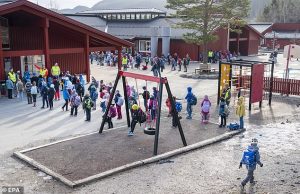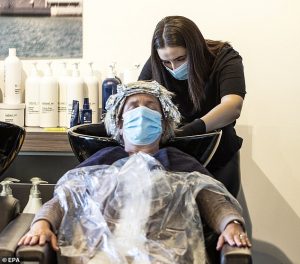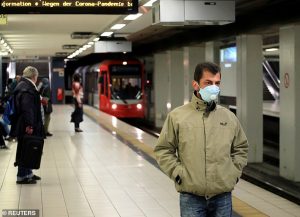Recently, countries in Europe have began to take steps to come out of the lockdown. Switzerland passes directive for primary schools to be open, while wearing of masks have been made mandatory in taking the public transport in Germany.
Other parts of Europe have also followed the same trend as swiss shoppers are now returning to garden centres and salons today. The army has also made plans to hand out a million masks a day to shops and business owners.
Germany with a population of 83 million, has passed into law the compulsory use of masks in the public transport system while other states within the european nation have imposed stricter rules.
In Norway, children from the age of six to ten have been allowed to resume school in classes of up to 15 pupils. However, parents have shown concern that the re-opening is premature.
According to recent reports, world footballing nation, Spain has lifted one of Europe’s toughest lockdown measure as it allows children back out, however, the leagues are still on lockdown. Italy has also started to put measures in place to lift the quarantine.
Here are more updates around Europe on the ease of the lockdown:
Norway
Signs at the entrance to the school outside Oslo read ‘nice to have you back’ while another poster featured a rainbow with the message ‘everything will be fine’. The country has also allowed hair salons and dermatologists to resume their business.
Concerned parents have criticised the move, saying that some nursery staff have already tested positive since they returned to work last week. Following this developement, an online group called ‘My Child Should Not Be A Guinea Pig For Covid-19’ has attracted 30,000 members.

One mother, Karine Rabbe, said today: ‘If it were up to me entirely, I would probably wait a couple of more weeks because I don’t think we have all the information we need at this point.’
In some regions of Norway where authorities say they have brought the epidemic under control, primary schools re-opened today a week after the youngest children returned to nurseries.
Pupils aged six to ten were back at their desks after six weeks of remote learning, with classes reduced to a maximum of 15 at a time. Rabbe said her daughter had been ‘so excited’ to return to school that she woke up at 6am without an alarm clock.
Many measures remain in place, such as bans on sporting and cultural events, as well as social distancing and hygiene recommendations.
Austria
Austria’s President Sebastian Kurz has said he will make sure the country’s key workers pay fewer taxes and that multinationals should pay more, in a bid to jumpstart the economy as the country eases its coronavirus lockdown measures.
“Whether care workers, security forces, supermarket employees or many others – whoever works hard should in future have more in their pocket. That is a question of social justice but also in times like these it is also necessary to stimulate domestic consumption,” Kurz said in a televised address on the 75th anniversary of Austria’s Second Republic.
The president said that €14 billion euros ($15 billion) of the €38 billion promised by his government — a coalition between Kurz’s conservatives and the left-wing Greens — had already been paid out. He hinted that more was to come.
Along with cutting taxes for low and middle incomes, he said he would seek a greater tax contribution from multinationals.
Switzerland
The European nation has seen the need to following the footsteps of it’s neighbours Germany and Austria by allowing a selection of shops including DIY and garden centres to re-open first.
Some essential and nonessential workers like doctors’ surgeries, dentists, creches, hairdressers and massage and beauty salons can all re-open today if they take sufficient health precautions.


Also, food shops that sell other essential goods are allowed to re-open the whole store, while mourners outside the immediate family are allowed to attend funerals.
Hospitals are also allowed to perform their whole range of procedures including non-urgent operations from today. If the initial re-opening does not lead to a new spike in Coronavirus Disease cases, Swiss authorities plan to open other shops and schools from May 11.
Germany
The German government has mandated the use of masks everywhere on public transport. Some other states within the European nation are also demanding the use of masks within shops. Following this development, some regional authorities are imposing fines on people who breach the rules.
Berlin mayor Michael Mueller said the measure was being imposed in order ‘to be able to protect people’ on trains, buses and trams. Unlike in shops, it was ‘not possible to ensure a distance of several metres between each person’ on public transport, he said.

Mueller and other state premiers have emphasised that improvised masks would also be acceptable.
Supporting the policy on wearing masks, Germany has announced plans to ramp up domestic production of masks to 50 million a week by August.
‘I said protection of the nose and mouth…it can also be a scarf,’ said the Berlin mayor.
Spain, Italy, France and Czech Republic
Just yesterday, children under the age of 14 have been allowed to leave their homes for the first time in six weeks after a backlash against a particularly tough lockdown rule.
Spain has also imposed strict restrictions on residents who want to leave their homes on the basis of physical exercise.
However, the rules have been relaxed to allow children one hour of supervised outdoor activity within 1,100 yards of their home. Adults can accompany up to three children, who will not be allowed into playgrounds and must observe a 6.5ft safety distance.
Italian government made an announcement last night that it will start lifting Europe’s longest-running lockdown on May 4 as factories and building sites will be allowed to re-open. After two weeks, retailers will follow suite while restaurants and bars will be allowed to re-open fully from the beginning of June although takeaway business will be possible earlier.
Neighbouring COVID-19 striken country, France is yet to take any significant steps out of a lockdown which is currently in force until May 11. However, prime minister Edouard Philippe is expected to present the government’s exit strategy to parliament on Tuesday.
Elsewhere, the Czech Republic is re-opening universities today after raising the limit on public gatherings from two people to ten on Friday.
The country has also lifted a ban on non-essential movement and travel abroad, health minister Adam Vojtech said last week. Those who travel abroad will have to present a negative coronavirus test upon return or be subject to two-week quarantine, he said.
As Europe continues to ease on the lockdown, it indicates the eagerness of the continent to restart the economy and return to normal life. However, several nations and world organisations have expressed their concerns as a second wave of the virus might be imminent.
